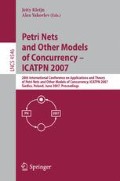Abstract
Most information systems that are driven by process models (e.g., workflow management systems) record events in event logs, also known as transaction logs or audit trails. We consider processes that not only keep track of their history in a log, but also make decisions based on this log. To model such processes we extend the basic Petri net framework with the notion of history and add guards to transitions evaluated on the process history. We show that some classes of history-dependent nets can be automatically converted to classical Petri nets for analysis purposes. These classes are characterized by the form of the guards (e.g., LTL guards) and sometimes the additional requirement that the underlying classical Petri net is either bounded or has finite synchronization distances.
Access this chapter
Tax calculation will be finalised at checkout
Purchases are for personal use only
Preview
Unable to display preview. Download preview PDF.
References
Baldan, P., Busi, N., Corradini, A., Pinna, G.M.: Domain and event structure semantics for Petri nets with read and inhibitor arcs. Theoretical Computer Science 323(1-3), 129–189 (2004)
Best, E., Devillers, R.R.: Sequential and concurrent behaviour in Petri net theory. Theoretical Computer Science 55(1), 87–136 (1987)
Genrich, H.J., Lautenbach, K., Thiagarajan, P.S.: Elements of general net theory. In: Proceedings of the Advanced Course on General Net Theory of Processes and Systems, London, pp. 21–163. Springer, Heidelberg (1980)
Giannakopoulou, D., Havelund, K.: Automata-based verification of temporal properties on running programs. In: ASE, IEEE Computer Society (Full version available as a technical report) pp. 412–416 (2001)
Gischer, J.L.: The equational theory of pomsets. Theoretical Computer Science 61, 199–224 (1988)
Goltz, U., Reisig, W.: Weighted Synchronic Distances. In: Girault, C., Reisig, W. (eds.) Selected Papers from the First and the Second European Workshop on Application and Theory of Petri Nets. Informatik-Fachberichte, vol. 52, pp. 289–300. Springer, Heidelberg (1981)
Goltz, U., Reisig, W.: The non-sequential behavior of Petri nets. Information and Control 57(2/3), 125–147 (1983)
van Hee, K., Oanea, O., Serebrenik, A., Sidorova, N., Voorhoeve, M.: LogLogics: A logic for history-dependent business processes, vol. 65(1) (2007)
Hopcroft, J., Ullman, J.: Introduction to Automata, Theory, Languages, and Computation. Addison-Wesley, London (1979)
Jensen, K.: Coloured Petri Nets. Basic Concepts, Analysis Methods and Practical Use. In: Monographs in Theoretical Computer Science, Springer, Heidelberg (1997)
Montanari, U., Pistore, M.: History-dependent automata: An introduction. In: Bernardo, M., Bogliolo, A. (eds.) SFM-Moby 2005. LNCS, vol. 3465, pp. 1–28. Springer, Heidelberg (2005)
Petri, C.A.: Interpretations of net theory. Technical Report ISF-Report 75.07 (1975)
Pratt, V.R.: Some constructions for order-theoretic models of concurrency. In: Parikh, R. (ed.) Logics of Programs. LNCS, vol. 193, pp. 269–283. Springer, Heidelberg (1985)
Silva, M., Murata, T.: B-fairness and structural b-fairness in Petri net models of concurrent systems. J. Comput. Syst. Sci. 44(3), 447–477 (1992)
Suzuki, I., Kasami, T.: Three measures for synchronic dependence in Petri nets. Acta Inf. 19, 325–338 (1983)
Valk, R.: On the computational power of extended Petri nets. In: Winkowski, J. (ed.) Mathematical Foundations of Computer Science 1978. LNCS, vol. 64, pp. 526–535. Springer, Heidelberg (1978)
Wimmel, H., Priese, L.: Algebraic characterization of Petri net pomset semantics. In: Mazurkiewicz, A.W, Winkowski, J. (eds.) CONCUR 1997. LNCS, vol. 1243, pp. 406–420. Springer, Heidelberg (1997)
Winskel, G.: Event structures. In: Brauer, W., Reisig, W., Rozenberg, G. (eds.) Advances in Petri Nets. LNCS, vol. 255, pp. 325–392. Springer, Heidelberg (1986)
Author information
Authors and Affiliations
Editor information
Rights and permissions
Copyright information
© 2007 Springer Berlin Heidelberg
About this paper
Cite this paper
van Hee, K., Serebrenik, A., Sidorova, N., van der Aalst, W. (2007). History-Dependent Petri Nets. In: Kleijn, J., Yakovlev, A. (eds) Petri Nets and Other Models of Concurrency – ICATPN 2007. ICATPN 2007. Lecture Notes in Computer Science, vol 4546. Springer, Berlin, Heidelberg. https://doi.org/10.1007/978-3-540-73094-1_12
Download citation
DOI: https://doi.org/10.1007/978-3-540-73094-1_12
Publisher Name: Springer, Berlin, Heidelberg
Print ISBN: 978-3-540-73093-4
Online ISBN: 978-3-540-73094-1
eBook Packages: Computer ScienceComputer Science (R0)

